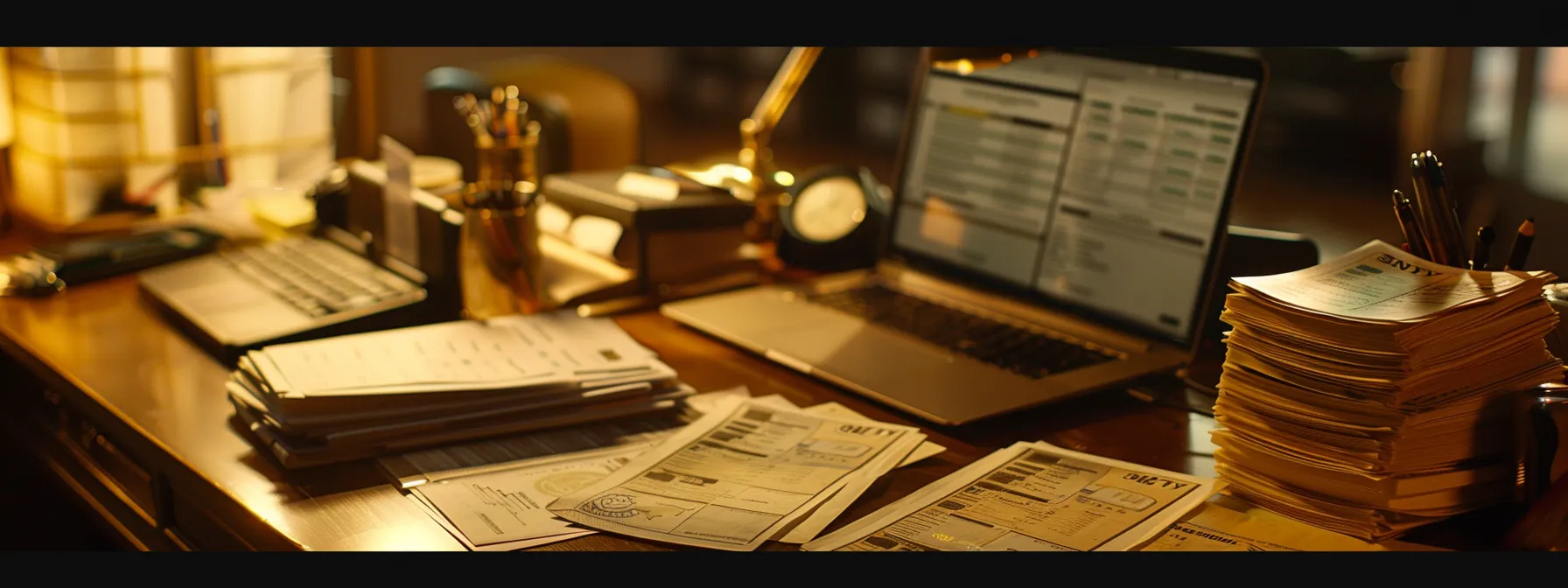When ordering cheques, many small business owners overlook the importance of verifying their cheque order information. A single mistake can lead to issues like fraud or delays, impacting operations. This article will outline essential steps to confirm your details, including gathering necessary banking information and reviewing order specifics. By the end, readers will understand how to prevent costly errors and ensure their orders are accurate. Engaging with this content will help eliminate concerns about cheque discrepancies, facilitating smoother financial transactions like demand drafts or fixed deposits while complying with requirements such as goods and services tax.
Understand the Importance of Accurate Cheque Order Information

Accurate cheque order information is crucial for ensuring smooth financial transactions. When clients provide precise details such as their salary and income, it minimizes the chances of errors that could delay the cheque processing. Ensuring these details are correct helps maintain trust and efficiency in business relationships.
Including the correct zip code during cheque orders plays a significant role in timely delivery. Incorrect zip codes can lead to delays, affecting cash flow for businesses that depend on prompt payments, such as those related to mortgage obligations. A small mistake in this area can have large repercussions for both the sender and the recipient.
The risk associated with inaccurate cheque order information can lead to serious financial consequences. Without careful input of necessary details, companies might face complications that could affect their ability to meet payroll, affecting employees’ salary payments. This can strain relationships between employers and employees, potentially impacting productivity.
Overall, verifying cheque order details enhances business operations and protects against financial mishaps. By making sure that information is accurate at the outset, companies can create a streamlined process for issuing payments. This fundamental step not only solidifies their reputation but also safeguards against any potential risks involved with errors in financial documentation.
Order details matter. Next, discover where to find trustworthy sources for your cheque needs.
Proceed With Reliable Sources for Ordering Cheques

Evaluating online cheque order companies is vital for maintaining secure personal finance practices. Researching providers ensures they have robust security and privacy measures, protecting against identity theft. Additionally, understanding the printing process, including ink usage and payment systems, helps businesses make informed choices that safeguard their financial transactions. Each of these considerations plays a critical role in ensuring a reliable order process.
Evaluate Online Check Order Companies
When evaluating online cheque order companies, a consumer should prioritize those that demonstrate a solid commitment to security and accountability. By ensuring that the company adheres to guidelines set by the Consumer Financial Protection Bureau, clients can reduce their liability associated with cheque fraud. Checking for proper protocols that protect personal information is essential for anyone ordering cheques, particularly those who act as a drawer in financial transactions.
In addition, it is advisable to understand the terms of contracts offered by different providers. Clear and accessible contracts can outline the responsibilities of both the consumer and the cheque printing company, which is critical for smooth transactions. By being thorough in this evaluation, individuals can protect themselves from potential financial missteps and maintain a positive relationship with their chosen cheque supplier.
Verify Security and Privacy Measures in Place
To protect sensitive financial information, it is crucial for businesses to verify the security and privacy measures of cheque order providers. A trustworthy service should adhere to regulations set forth by financial institutions, ensuring that clients’ personal details are safeguarded against unauthorized access. Furthermore, providers that use advanced technology and encryption should be prioritized, as this enhances protection when clients are using mobile apps or online portals to place orders.
Clients should also consider the price of the services in relation to the security features offered. Opting for a provider that includes robust security protocols may ultimately prove beneficial, especially for businesses that manage a savings account or are involved with the national pension system. By making informed decisions about cheque orders, companies can maintain strong relationships with their clients and employees, ensuring that all transactions are secure and efficient.
Choosing the right supplier sets the groundwork for your cheque needs. Next, ensure you have all essential personal and banking details ready for a smooth ordering process.
Gather All Necessary Personal and Banking Details

Ensuring accurate cheque order information begins with confirming that personal and banking details are correct. Clients should verify their name and address to avoid potential issues. It is also essential to check the bank account number and routing number, as errors here can complicate check endorsements or electronic funds transfer. Proper diligence in these areas helps accountants adhere to law requirements and maintain smooth financial operations.
Confirm Your Name and Address Are Correct
When placing an order for cheques, it is essential for clients to confirm that their name and address are correct. Discrepancies in these details can lead to issues with bank statements or invoices, complicating transactions. By ensuring these fundamental details are accurate, businesses can prevent unnecessary delays and maintain a smooth payment process.
Clients should also take the time to verify their address matches their financial documents, such as the debit card linked to their account. This diligence not only aids in preventing errors but also ensures that any blank cheques issued will be processed seamlessly. Addressing these specific areas enhances overall reliability when managing mutual fund transactions or other financial activities.
Check Your Bank Account Number and Routing Number
When placing a cheque order, it is vital for clients to meticulously check their bank account number and routing number. These details are integral to ensuring seamless transactions, particularly for property-related payments or any cash disbursements. An error in these numbers can lead to complications with endorsements, causing delays that may impact a customer‘s ability to meet financial obligations, such as debts.
Utilizing magnetic ink character recognition (MICR) technology on cheques enhances the automatic processing of these critical banking details. Businesses should ensure that their bank account and routing numbers are not only accurate but also conform to guidelines required for electronic funds transfers. This verification step helps in ensuring timely payments and maintains trust in business relationships, ultimately benefiting both the customer and the service provider.
With your personal and banking details in hand, it’s time to focus on what really counts. Take a moment to scrutinize the order details; this step ensures your cheques are exactly as you need them.
Review the Order Details Before Finalizing

Before finalizing a cheque order, clients must double-check the itemized information to ensure accuracy. Attention should be given to potential common errors in cheque design, which can lead to complications with online banking and overdraft issues. These steps not only enhance the reliability of the order but also protect against unexpected fees, ensuring seamless credit transactions.
Double-Check Itemized Information on Your Order
Before completing a cheque order, it is essential for clients to meticulously double-check the itemized information to ensure accuracy. Confirming details such as the bank account number and employment information can prevent complications that may arise from discrepancies. A thorough review of these elements not only safeguards against potential delays but also protects against financial errors that could impact business operations.
Verifying the itemized information also includes cross-referencing any details with official documents, such as statements from the Reserve Bank of India, to confirm accuracy. This diligence will help ensure that all transactions are processed seamlessly, minimizing obstacles associated with payroll or vendor payments. By taking this proactive approach, clients can maintain smooth financial operations and uphold trust in their business relationships.
Look for Common Errors in Cheque Design
When reviewing cheque designs, individuals should be vigilant about common errors that can lead to processing complications. An inaccurate cheque design can include incorrect font sizes or misplaced elements, which might render the cheque non-compliant with bank standards. For instance, if the routing number or account details are positioned incorrectly, it could hinder the cheque‘s acceptance, delaying payments and affecting cash flow.
Clients should also examine the alignment of text and numerical data on the cheques. Any misalignment can raise concerns during automated processing, potentially resulting in transaction errors. Ensuring that all elements are clear and correctly placed not only streamlines cash management but also fosters trust in financial dealings, ultimately benefiting both the business and its partners.
Once the order details are set, the next step holds its own importance. Observing the journey of your purchases brings peace of mind and ensures timely delivery.
Utilize Tracking Tools for Orders

Tracking tools play a vital role in managing cheque orders effectively. By monitoring cheque delivery, clients can ensure that their orders arrive accurately and on time, minimizing potential disruptions. Confirming receipt of the correct cheque order solidifies trust in the process and strengthens client-supplier relationships, ultimately contributing to smoother financial operations.
Track Your Cheque Delivery
Tracking cheque delivery is an essential step for businesses to ensure their financial transactions remain uninterrupted. By using tracking tools provided by cheque printing companies, clients can monitor the shipment status of their orders in real time. This capability helps businesses confirm that their cheques arrive on schedule, allowing for timely payments and reducing the risk of financial complications.
Moreover, effective tracking tools can alleviate concerns about potential delays or incorrect orders. When clients can easily verify the status of their cheque delivery, they gain reassurance that everything is proceeding smoothly. This transparency is vital in maintaining strong relationships with suppliers, employees, and financial institutions, supporting efficient financial operations and a trustworthy business environment.
Confirm Receipt of Accurate Cheque Order
Confirming receipt of an accurate cheque order is a vital aspect of maintaining efficient financial operations. After placing an order, businesses should utilize tracking tools provided by cheque printing companies to monitor the shipment. This step allows companies to ensure that the cheques arrive as expected, preventing delays that could disrupt payroll or vendor payments.
Upon receiving the cheque order, clients must carefully inspect the contents against the original order details. Verifying that the account numbers, names, and other crucial information match helps avoid future banking complications. By taking this proactive approach, businesses can sustain trust with their financial partners and ensure seamless processing of transactions.
Tracking your orders keeps you informed, but that’s just the start. Keeping detailed records will provide insights that help you manage your business better.
Maintain Records of Your Orders

Keeping detailed records of cheque orders is a vital practice for ensuring accuracy in financial transactions. Clients should keep copies of order confirmations to verify the details of their requests, as this serves as a point of reference. Additionally, documenting any discrepancies encountered during the order process aids in addressing issues efficiently and fosters better communication with cheque suppliers. These steps enhance overall transaction reliability.
Keep Copies of Order Confirmations
Keeping copies of order confirmations serves as a critical safeguard for businesses in managing their cheque orders. These documents act as a reference point for verifying essential details such as account numbers and cheque amounts. By retaining this information, businesses protect themselves against any discrepancies that may arise during processing, ensuring that they can effectively address issues with suppliers if necessary.
Furthermore, having documented order confirmations streamlines communication with cheque printing companies when resolving any problems. For example, if a business encounters an error in their cheque design or personal details, having the original confirmation makes it easier to clarify the issue and seek prompt corrections. This practice not only enhances operational efficiency but also reinforces trust in the overall relationship between clients and cheque suppliers.
Document Any Discrepancies for Future Reference
Documenting any discrepancies that arise during the cheque order process is crucial for maintaining oversight in financial transactions. With detailed records, businesses can quickly reference issues they face, ensuring effective communication with cheque suppliers. This practice not only assists in resolving problems but also reinforces the importance of accuracy in future orders.
By keeping a log of any discrepancies, companies can learn from their experiences, avoiding similar mistakes in subsequent cheque orders. This proactive approach enhances overall order reliability and strengthens trust with financial partners. Accurate documentation allows businesses to uphold high standards in their cheque management process, ultimately contributing to smoother operations and better financial health.

